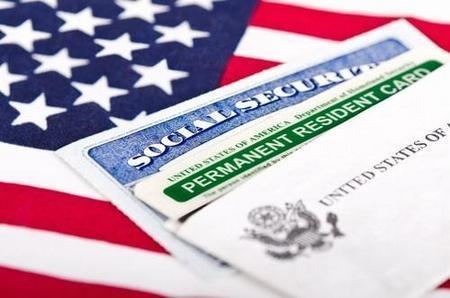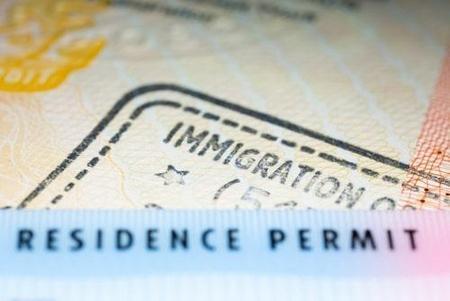Recent Blog Posts
How Can I Seek Compensation in a Chain Reaction Car Accident?
Being in a car accident involving multiple vehicles can be an extremely frightening experience, especially if you are injured in the accident. Crashes with numerous automobiles, also known as chain reaction accidents, can end up causing relatively serious injuries such as broken bones, spinal cord injuries, brain injuries, or even death in some cases. Chain reaction accidents typically involve three or more vehicles that collide, which was initially caused by one primary incident, often a rear-end collision. Chain reaction accidents are often chaotic and occur quickly, which is one of the reasons why it can be difficult to determine who is at fault for the accident. Recovering compensation from the accident can be tricky, which is why experienced legal counsel can help.
Military Members and Veterans Can File for Naturalization Online
 Every year on Memorial Day, we honor our veterans of the United States Armed Forces. Recently, the United States Citizenship and Immigration Services (USCIS) announced that U.S. service personnel and veterans can now file an Application for Naturalization, Form N-400, online. The USCIS is the federal agency that oversees legal immigration to our country.
Every year on Memorial Day, we honor our veterans of the United States Armed Forces. Recently, the United States Citizenship and Immigration Services (USCIS) announced that U.S. service personnel and veterans can now file an Application for Naturalization, Form N-400, online. The USCIS is the federal agency that oversees legal immigration to our country.
What Is Naturalization?
Anyone who is born in the United States or who is born abroad to parents who are U.S. citizens is automatically a U.S. citizen through birthright and can claim that citizenship at any point throughout his or her lifetime. The other way to become a legal citizen is through naturalization. Naturalization is the legal process by which a non-citizen or lawful permanent resident can acquire citizenship or nationality.
Online Filing for Naturalization
USCIS is meeting the needs of today’s applicants, petitioners, and employees by using technology to streamline many of its processes. Filing applications online allows aliens to submit application forms electronically, receive updates from USCIS, and check the status of their case. Regardless if an application or petition is done electronically or the old-fashioned way with paperwork, USCIS is dedicated to ensuring a secure and efficient process for everyone.
4 Things You Can Do to Prevent a Nighttime Car Accident

According to the National Safety Council (NSC), Americans only do about one-quarter of their driving during nighttime hours. However, these same night hours are when around half of all traffic-related deaths occur. Nighttime driving is not something that can always be avoided. There are a variety of factors that are often present that increase the dangers of driving at night, some of which are in the motorist’s control, and some of which are not. For example, there tend to be more intoxicated and/or fatigued drivers on the road at night than there are during the day. If you have been involved in a nighttime car accident, you should reach out to a personal injury attorney to discuss your options for seeking damages.
Staying Safe When You Are On the Road at Night
One of the biggest obstacles that a driver faces at night is the darkness itself. This increases the chances that a motorist will not see an obstacle in his or her path and end up not having enough time to stop or veer out of the way. Because driving at night is so much more dangerous than driving during the day, there are steps you should take to make sure you are being as safe as possible:
What Are the Grounds for Inadmissibility and Deportability?
 Immigration can be a complex process that involves many legal steps. The United States Citizenship and Immigration Services (USCIS) manages the nation’s immigration system by safeguarding its integrity. USCIS fairly adjudicates requests for immigration benefits while protecting American citizens and securing our country. U.S. immigration laws include different rules governing whether non-citizens may be deported back to their native country or prohibited from entering the United States. The laws separate these grounds into two distinct categories: grounds of inadmissibility and grounds of deportability. It is important to understand what actions constitute both of these since it can significantly alter the outcome of an immigration case.
Immigration can be a complex process that involves many legal steps. The United States Citizenship and Immigration Services (USCIS) manages the nation’s immigration system by safeguarding its integrity. USCIS fairly adjudicates requests for immigration benefits while protecting American citizens and securing our country. U.S. immigration laws include different rules governing whether non-citizens may be deported back to their native country or prohibited from entering the United States. The laws separate these grounds into two distinct categories: grounds of inadmissibility and grounds of deportability. It is important to understand what actions constitute both of these since it can significantly alter the outcome of an immigration case.
Grounds for Inadmissibility
These grounds apply to an individual who would like to be admitted to the United States, including entry and the right to remain in the country legally with a Green Card, also known as lawful permanent resident (LPR) status.
3 Negative Effects That High-Conflict Divorce Can Have on Children
 While it is true that the effects of divorce vary from person to person and family to family, psychology experts reveal that certain circumstances, such as the environment created by a contentious divorce, can be particularly detrimental. This is especially true for children, and high levels of conflict between parents can affect their development. Having a positive co-parenting strategy in place as you move throughout the divorce process can make a big difference when it comes to your child’s mental health. However, for many couples, it is not always easy to enforce such a plan when the relationship is a contentious one.
While it is true that the effects of divorce vary from person to person and family to family, psychology experts reveal that certain circumstances, such as the environment created by a contentious divorce, can be particularly detrimental. This is especially true for children, and high levels of conflict between parents can affect their development. Having a positive co-parenting strategy in place as you move throughout the divorce process can make a big difference when it comes to your child’s mental health. However, for many couples, it is not always easy to enforce such a plan when the relationship is a contentious one.
Negative Effects of Divorce on Kids and What You Can Do to Help
It can be difficult for parents to face the reality of the negative impact of divorce on their kids, but the good news is that studies show that healthy co-parenting cannot only help your kids, but it can help you too. When parents attempt to collaborate peacefully during their divorce, this will lessen their child’s distress, and it can reduce stress for parents as well. Here are some major ways that a high-conflict divorce can impact your child and what you can do to ease the burden:
3 Ways to Minimize Stress When Divorcing During a Stay-at-Home Order

Amid the coronavirus crisis and the many stay-at-home orders in effect across the country, families everywhere have been struggling with stress at home on unprecedented levels. Time magazine reports that other countries, such as China, have seen a major spike in divorce filings now that people are able to go out and about again, and in many places, domestic violence has been on the rise for those who are still stuck at home. This is all very grim news, but experts have pointed out some key observations about these troubling trends, and this may offer some insight and help for those currently struggling in their own marriages as the pandemic continues.
Factors Currently Contributing to Marriage and Family Stress at Home
The reported surge of divorce filings in China following recent stay-at-home orders suggests that couples who were already experiencing tension and potential separation likely felt an even greater strain once confined to the home together for an extended period of time. The same circumstances are undoubtedly arising right here in Illinois and across the United States. Experts highlight the fact that not only are families currently experiencing major financial stress due to job loss, they are also limited in living space and in alone time. This is especially true for those who share children and are now forced to manage and cope with the kids being home every day, around the clock. Additionally, there is anxiety circulating throughout the home about family members getting sick, when normal routines will resume, and a general sense of uncertainty about the future.
Can I Seek Compensation for Emotional Trauma After a Car Accident?

According to the National Highway Traffic Safety Administration (NHTSA), more than 6.7 million vehicle crashes occur each year, resulting in more than 36,000 deaths and 2.7 million people injured. Studies have found that the most common cause of post-traumatic stress disorder (PTSD) in the general population is car accidents. In fact, a study conducted by the National Institute of Mental Health found that nearly 40 percent of survivors of motor vehicle accidents developed PTSD. Following a collision, you may not only suffer from emotional trauma, but you likely will also experience physical injuries, in addition to extensive damage to your vehicle. If you have been a victim of a car accident, you should speak with an Illinois personal injury lawyer right away.
Signs and Symptoms of Emotional Trauma
Getting into a car accident is a major event for anyone involved. It is completely normal for you to feel a range of emotions after the accident, especially after the adrenaline wears off. You may immediately recognize some of these feelings, but it may take days or even months to notice the full effects of the crash. Common signs of emotional trauma after an automobile collision include:
Tips to Help an Immigrant Relative Adjust to Life in the United States
 Even if you are a citizen of the United States, you may have relatives who are not. Whether you were born here or immigrated to this country later in life, you can help other relatives become lawful permanent residents (LPR) by obtaining a Green Card. In order to do so legally, you need to sponsor your family member and be able to prove that you have an adequate income or assets to support him or her upon entrance to the United States. Once your relative arrives, it may take some time for him or her to acclimate to the new culture. Your community may have resources that are dedicated to refugees, immigrants, and international visitors to ease the transition.
Even if you are a citizen of the United States, you may have relatives who are not. Whether you were born here or immigrated to this country later in life, you can help other relatives become lawful permanent residents (LPR) by obtaining a Green Card. In order to do so legally, you need to sponsor your family member and be able to prove that you have an adequate income or assets to support him or her upon entrance to the United States. Once your relative arrives, it may take some time for him or her to acclimate to the new culture. Your community may have resources that are dedicated to refugees, immigrants, and international visitors to ease the transition.
U.S. Immigration Law
The law gives special consideration to immediate relatives of a U.S. citizen, which means there is no waiting list to immigrate these relatives. Immediate family members include:
How Does the Federal CARES Act Impact Immigration?
 In response to the global pandemic of COVID-19, the United States federal government has passed the Coronavirus Aid, Relief, and Economic Security (CARES) Act. This stimulus package will allocate trillions of dollars to struggling citizens and businesses due to the economic downturn that the virus has caused. Many people all over the world may have questions regarding government services during this uncertain time, such as the immigration process. The United States Citizenship and Immigration Services (USCIS) recently announced that the Public Charge Rule will not restrict access to testing, screening, or treatment of infectious diseases, including COVID-19.
In response to the global pandemic of COVID-19, the United States federal government has passed the Coronavirus Aid, Relief, and Economic Security (CARES) Act. This stimulus package will allocate trillions of dollars to struggling citizens and businesses due to the economic downturn that the virus has caused. Many people all over the world may have questions regarding government services during this uncertain time, such as the immigration process. The United States Citizenship and Immigration Services (USCIS) recently announced that the Public Charge Rule will not restrict access to testing, screening, or treatment of infectious diseases, including COVID-19.
The Public Charge Rule and Stimulus Payments
According to U.S. immigration law, the Public Charge Rule outlines that immigrants to the United States who are classified as “likely” to become a Public Charge may be denied visas or lawful entrance to the country based on their disabilities or inadequate economic resources.
3 Tips for Determining if Alternative Dispute Resolution Is Right for You
 Divorce is often viewed as a tumultuous process, but this is not always the case. In fact, some couples still value their bond and prefer to end things peacefully. Others recognize that fighting increases the financial and emotional costs for everyone involved. In these situations, parties may opt to pursue alternative dispute resolution over a litigated divorce. However, this path may not be right for every couple, and litigation may be the only way to successfully finalize a divorce.
Divorce is often viewed as a tumultuous process, but this is not always the case. In fact, some couples still value their bond and prefer to end things peacefully. Others recognize that fighting increases the financial and emotional costs for everyone involved. In these situations, parties may opt to pursue alternative dispute resolution over a litigated divorce. However, this path may not be right for every couple, and litigation may be the only way to successfully finalize a divorce.
Mediation or Litigation?
If you are considering using mediation during your divorce, it is important to know that victims of any form of abuse (mental, physical, or financial) are generally encouraged to lean towards litigation instead, as it tends to offer greater protection throughout the divorce process. Litigation is also preferred when there is suspicion of hidden assets. However, contention or disputes between the parties do not mean that a couple cannot pursue alternative dispute resolution; if anything, this particular divorce path may offer some benefits for couples, as long as both parties are at willing to bring their concerns and disagreements to the table in a civil manner. Both parties are encouraged to work together and reach a compromise on sensitive matters, like the division of assets and the creation of a parenting plan. The goal is to make sure that each party walks away with at least some of what they want and a fair portion of what they deserve.
 English,
English,
 Spanish,
Spanish,
 Polish,
Polish,
 Urdu
Urdu














 Make a Payment
Make a Payment



